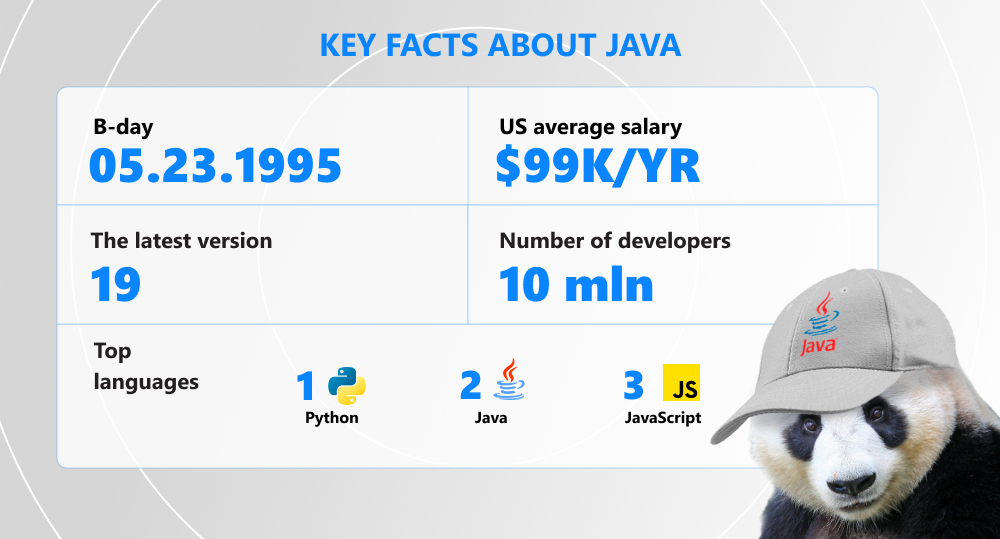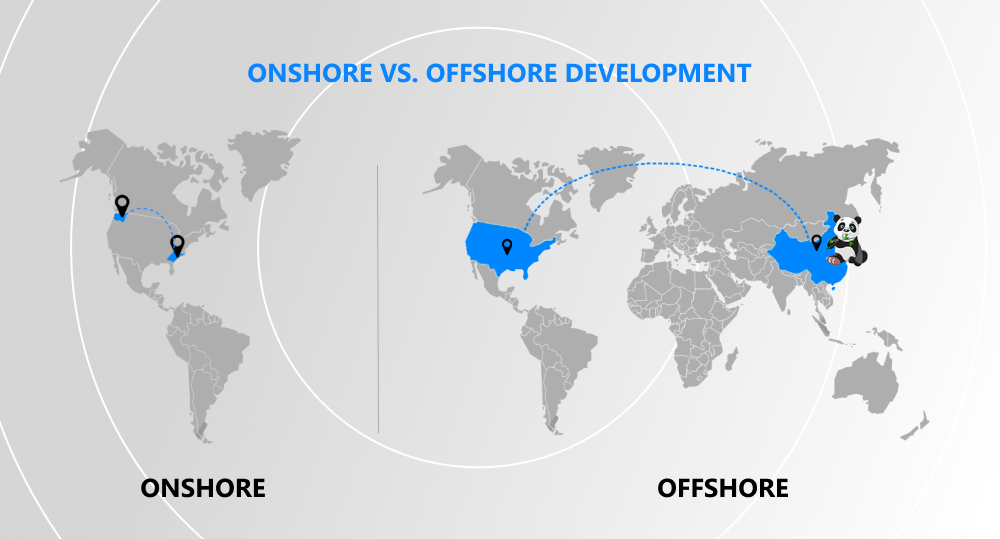Imagine: a cold winter morning, a boiling kettle, a steaming mug of your favorite Java coffee, with the latter reminding you that your team is short of dedicated programmers. How about the idea of reaching out to the experts in offshore Java development?
If that sounds appealing enough, then brew another cup of coffee, make yourself comfortable, and get ready to discover the world of offshore Java developers. Today, we'll reveal all their secrets — what is the difference between offshore and onshore and where to find specialists worth their money — and answer another most frequent questions about offshore Java development services. Ready to dig in?
written by:
Sergey Pupkevich
Head of Java Department
Contents
Why Is the World Still into Java?
The second most popular programming language in the world, 10+ million developers, one of the highest-paid areas in the IT industry. These are just a small part of the indicators that turn Java into one of the most in-demand programming languages worldwide.
The Java programming language was first released in 1995. Since then, it has been winning the hearts of developers all around the globe. You'd think, what's so special about a language that will soon turn 30 years old? Why is it still able to hold the ground against its younger competitors like Dart, Go, or Kotlin? Let's find out.
1) Object-Oriented Nature
Java is an object-oriented programming language. This means it uses objects rather than actions in its programming. They can be reused and extended to create new applications.
Object-oriented programming also enhances security. It binds functions and data into a single entity and prevents unauthorized access.
2) Simplicity
Java is considered a high-level programming language as it is human-readable. What does this mean? Developers write code in human words, which makes it easy to read, understand, and learn. This is a big plus for those who hire offshore Java developers, as after reading the code for the first time, they can easily understand it and get to work right away.
What makes Java even simpler is the absence of many complex concepts found in other languages, such as operator overloading or pointers.
3) Low Cost of Development and Maintenance
Building apps in Java is more affordable than in most other languages, since everyone can easily find all the resources they need online. It's also cheaper to maintain code over time. How is this possible? The Java language is designed with the ease of maintenance in mind thanks to such features as backward compatibility, Garbage Collection, and a rich set of libraries.
4) Security
Remember pointers? By getting rid of them, Java not only makes life easier for developers, but also significantly reduces security threats. How? Using pointers can lead to unauthorized access since they store the address of another value in memory. Java doesn't use them, so there are fewer security issues.
Another strong data protector is the Security Manager, separate for each app. It allows programmers to define access rules for classes.
5) Platform Independence
The “Write Once Run Anywhere” principle is a well-known slogan of Java software. This means every app written in this language can run on any operating system, making Java a great choice for developing cross-platform applications.
The platform independence feature also makes Java portable, meaning that if necessary, any application can be ported to and run on any platform you want.
6) Backward Compatibility
One of Java's most impressive strengths is its backward compatibility. It guarantees that applications written in older versions of the language will still run on newer versions. This is a big deal for developers, as it gives them confidence that they will not have to rewrite their code as the language evolves.
Backward compatibility is one of the major selling points for Java. It makes the language well-suited for mission-critical applications because when you create something that needs to work reliably, you can't afford to take risks.
7) Multithreading
Another useful characteristic of Java is multithreading, which allows several threads to run simultaneously. But what is a thread? It's the smallest unit of a process. With multithreading, developers can maximize CPU utilization.
How does it help? If an app has multiple threads running at the same time, they work independently without affecting each other. This improves the performance and efficiency of the software.
8) Automatic Memory Management
A common problem in software development is objects that are no longer used by programs. They require manual dereferencing or removal. This takes time, which is never enough.
Java offers a great solution to this issue: it automatically removes unused objects. For this, it launches the Garbage Collection process managed by the Java Virtual Machine (JVM).
9) Memory Allocation
The JVM is not only responsible for Garbage Collection, but also provides an effective method of memory allocation. It divides memory into two components — the Stack and the Heap Area. Whenever developers need to declare a variable, the JVM provides space to store it in either of the two areas.
10) Distributed Processing
Another useful feature of Java that improves system performance and efficiency is distributed processing. It uses RMI (Remote Method Invocation), a mechanism that helps exchange data between multiple computers.
Java also supports Socket Programming and the CORBA technology, which provides access to object sharing in a distributed environment.
Hiring Java Developers: Onshore vs. Offshore
There's no question that hiring qualified Java developers is a challenging task. This language is in high demand, so the shortage of skilled workforce has led many companies to outsource Java programming to countries where the talent pool is larger, and labor costs are lower.
Business owners can choose between two basic options: hire an onshore or offshore Java developer. Let’s examine the major differences between them.
Onshoring
Offshoring
What Is It?
You hire Java developer talent (or any other talent) in the same country as yours. The city may be different.
You hire a development team in another country or even on a different continent.
Developer Team
Domestic
Foreign
Language
Same
Usually different, but most companies use English for business communication.
Communication Efficiency
High. Frequent 1-on-1 calls, face-to-face meetings
Low. Language barrier, considerable time lag
Culture
Same
Different
Labor Market
Tight
Loose
Price Tag
High
Low
Examples for a US Company
Texas, Los Angeles, Atlanta, Chicago, Philadelphia
Europe, Asia, Australia
Onshore outsourcing is when you outsource software development to a company located in the same country or region as your business. This can be a good choice if you want to always stay in touch with your Java programmers and have more control over the work being done.
Onshore Java developers are typically pricier than their offshore counterparts, but you may find that the extra cost is worth it for the peace of mind and quality control.
Key Benefits
Major Challenges
Collaboration in the same place and time
High hourly rates
Communication is under full control
Small talent pool
Brand awareness
Backdoor offshoring (when a company delegates certain tasks to an offshore team without notifying the project owner)
Investment in the local economy
Limited global reach
Offshore outsourcing is when you delegate the Java development job to a company in another country and time zone.
Offshore Java development services are usually less expensive than the onshore option, but you may have to sacrifice quality and communication for a lower price. However, if you decide to find Java developers offshore, you have the global labor market at your disposal. Why choose a dedicated Java developer out of 100 people when you can pick from 10 million?
Key Benefits
Major Challenges
Cost-effective option (next in line are only freelance Java developers)
Different time zones, significant time lag
Access to the global pool of talents
Language barrier and cultural differences
Faster time to market
Higher risk to contract with an unreliable company
Work around the clock
Lack of control over employees
Special benefits like tax exemption
Long knowledge transfer
How to Hire Java Developers Worth Their Salt
If you decide to hire offshore Java developers, based on all the positive points we've mentioned, you'll want to make sure you get the best of the best. The good news is there are plenty of such Java developers in the world. The key is knowing how to find them.
Here are some expert tips to help you build your dream team of offshore developers.
Specify Your Project Requirements
When hiring a team for offshore Java software development, it's crucial to formulate your requirements precisely to ensure a successful outcome. Many developers working offshore are unfamiliar with the nuances of dealing with foreign clients, so be clear about your expectations from the outset.
The following key points should be included in the requirements for the project:
- A detailed description of the project scope;
- A job description outlining the specific skills and experience you're looking for;
- A timeline for project completion;
- Project budget.
Consult with Colleagues
The best advisors on offshore outsourcing companies will be your peers, who already have experience collaborating with them. All you have to do is reach out to your network and seek recommendations. If you know someone who knows someone who is great at Java, ask for an introduction.
Another way is to turn to the global power — the Internet, namely social media. For example, LinkedIn, Instagram, or Stack Overflow. The local communities and their reviews will tell you exactly which companies are worth considering and which are not.
Assess Technical Knowledge
If you take the time to thoroughly evaluate each interviewee's competencies, you'll have a much better chance to hire a great Java developer.
During the interview, try to check several things relevant to the job:
- Test basic knowledge of general Java-related concepts: OOPs, multithreading, loops, data types, Garbage Collection, JIT, and other;
- Ask more concrete questions about each concept, how they work, and what their specifics are;
- Invite to solve some practical tasks;
- Inquire about experience with popular Java frameworks.
We’ve prepared a short table with all the basic competences that a Java developer of a particular rank should have. Check it out.
Junior Java Developer
Middle Java Developer
Senior Java Developer
Experience
1–1.5 years
2+ years
4+ years
Required Technical Knowledge
Java Core, Spring (Core, MVC, Security, Data), JDBC or Hibernate, SQL
Java Core, Spring (Core, Boot, MVC, Security, Data, Cloud, Integration), JDBC or Hibernate or JPA, SQL, Message Brokers, Docker
Java Core, Spring (Core, Boot, MVC, Security, Data, Cloud, Integration), Patterns, JDBC or Hibernate or JPA, SQL, NoSQL, Message Brokers, Docker, AWS, Multithreading, Microservices, CI/CD
English Proficiency
B1 and higher
B1 and higher
C1–C2
Test Soft Skills
Besides technical skills, a good Java programmer should have sufficient soft skills. They will help to work more effectively in a team, communicate better with colleagues and clients, and solve various work issues.
What skills to check:
- Critical thinking;
- Problem-solving skills;
- Communication skills;
- Stress resistance;
- Open-mindedness;
- Teamwork;
- Emotional intelligence.
Choose a Pricing Model
The pricing model for software development services you choose will affect the amount you pay for the work as well as the quality of the results you get. The two most common options are fixed price and hourly rate.
Fixed price is the simplest model, often used for small projects with a well-defined scope. Here, you and your team agree on a price upfront, and the developers are responsible for completing the work within the agreed upon budget.
Hourly rate gives you more flexibility than the fixed-price option. In this case, the payment is calculated as follows: the developer's rate is multiplied by the number of hours worked.
Hourly rates for Java development vary depending on several factors: developer experience, project scope, and development team location. In general, you can expect to pay somewhere between $10 and $350 per hour.
Location
Average Hourly Rates
Western Europe
$150–$300 per hour
Eastern Europe
$25–$45 per hour
Central/Western Asia
$10–$49 per hour
East/South Asia
$10–$300 per hour
North America
$100–$350 per hour
South America
$20–$55 per hour
Africa
$10–$99 per hour
Australia
$100–$300 per hour
Pick an Ideal Vendor
You can't just hire the first vendor you read positive reviews about. There is a myriad of companies that claim to be the best, but you should do your homework and find one that will meet all of your needs and expectations. How to ensure this:
- Check if they have a positive reputation. Browse online reviews and find out what other companies say about their experience with the vendor.
- Make sure they have a good track record. Ask for case studies or examples of previous projects they've worked on.
- Be clear about your needs. Before you start talking to vendors, define exactly what you're looking for. This will help you weed out those that aren't a good fit for you.
- Check to see how well the communication is working. One of the greatest challenges with outsourced projects is communication. Make sure you establish clear channels from the beginning of the collaboration.
To get a little further along in the tough business of choosing a service provider, take a look at the table below.
Top Offshore Development Companies — Java Expertise
Company Name
Location
Hourly Rates
SCAND
Warsaw, Poland
$25–$49
Programmers.io
Dallas, TX, United States
$25–$49
N-iX
Lviv, Ukraine
$50–$99
Qulix
Wrocław, Poland
$50–$99
Altoros
Pleasanton, CA, United States
$50–$99
Source: TopDevelopers
FAQ: the Darkest Secrets of Offshore Java Developers
1) Which to Choose — A Mid-Cost Offshore Java Development Company in Central Europe or Its Cheaper Competitor in Asia?
The cheaper option in Asia will be more appealing from a financial standpoint. However, you should consider the quality you want. Central European companies have more experienced Java developers who guarantee exceptional quality results.
2) What Are the Best Locations for Hiring Offshore Java Developers?
If budget is a sore point for you, choose Asian countries — India, Philippines, or Singapore. There you'll get the work done quickly and cheaply, only quality issues may arise. If you're looking for high-quality results and don't really care about the final figures, choose Western European countries, Canada, or Australia. The ideal is to settle for something in between. For example, Central or Eastern Europe. In countries like Poland, the Czech Republic, or Moldova, programmers are renowned for their excellent IT skills. At the same time, Java developer salary rates are low there, so you'll pay half as much when going for more Western outsourcing destinations.
3) Do I Have to Select Specialists for the Team Myself, or Will an Outsourcing Java Development Company Help Me?
If you outsource Java development to an offshore company, it will be responsible for helping you pick specialists with the skill set you need.
4) Why Do Java Developer Salaries Worldwide Vary So Much?
The main reason for the salary gap is the cost of living in different countries. Java developers in places with a high cost of living, such as the United States, usually earn more than those in less demanding locations, such as India or Brazil.
5) What Are the Risks if I Decide to Hire Freelance Java Developers?
First, there's always the possibility that a freelancer may not be as skilled as they claim to be. This can lead to subpar work or potential security issues. Another risk to consider is miscommunication. It can be hard to convey your vision and expectations to a freelancer, which can lead to them not meeting your needs. Finally, you should always consider the financial risk — you may not get exactly what you paid for if the freelancer is not experienced enough.
Offshore Java Development? Offshore Java Development!
Though you may not be full of determination and still have doubts whether you should outsource your product development, here's the good news. You're already halfway to success just because you've decided to create a project using a time-tested technology like Java.
The big question is: what should you choose — offshore or onshore services?
While both options provide results of the highest quality, offshore Java development delivers more benefits for businesses. It can provide access to top talent, speed up the development process, and save budget. Even though there are some risks to consider, such as language barriers and cultural differences, they can easily be mitigated with careful planning and regular communication.
Remember one essential thing: when picking out a company to outsource Java development, do your research, consider its reputation, experience, and cost. With the right partner, any outsourced project is bound to be a success.
Not sure where to start? Contact us today, describe your needs and wishes, and we'll provide you with a team of highly skilled Java developers ready to bring them to life.

Contacts
Feel free to get in touch with us! Use this contact form for an ASAP response.
Call us at +44 151 528 8015
E-mail us at request@qulix.com










